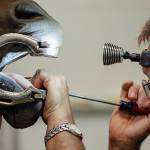Correction of Dental Malocclusions Does Not Improve Nutrient Absorption in Horses

Dental disease has long been an accepted cause of quidding, poor feed digestion, reduced body condition, and impaction colic in horses. Researchers recently reported that the correction of dental abnormalities improves the mechanical digestion of feed but does not affect nutrient absorption.
The natural chewing action of horses involves moving the lower jaw against the upper jaw in a circular motion. Changes to the shape of the teeth, such as ramps, hooks, wedges, and ridges, prevent the jaws from aligning correctly.
“When the jaws do not align, appropriate comminution of feeds does not occur. Comminution reduces a solid material to smaller particles, usually by crushing, grinding, cutting, or pulverizing. Horses with misaligned jaws cannot grind feeds as finely as those with correct jaw alignment,” explained Kathleen Crandell, Ph.D., a nutritionist for Kentucky Equine Research.
Fecal particle size (FPS) is a noninvasive means of evaluating comminution or chewing efficiency. To determine if correction of dental abnormalities affects FPS and postprandial nutrient concentration, researchers identified horses with dental disease, and then randomly assigned them to a control group or a dental group. The latter group received routine dental alignment performed by an International Association of Equine Dentists certified practitioner.
Blood and fecal samples were taken at the beginning of the study before performing dental work and again on day 56 of the study. Throughout the study period, all horses consumed a primarily forage-based diet of coastal Bermudagrass hay supplemented with 3 lb (1.4 kg) of pelleted feed.
The FPS was smaller in the horses that underwent dental work to correct malocclusions. However, researchers observed no change in nutrient concentrations in bloodwork.
“While previous reports suggested that comminution of feeds is positively associated with health, nutrition, and performance of horses, this study found no improvement in either glucose or amino acid absorption after dental work was performed,” Crandell said.
About the smaller FPS in the group of horses receiving dental work, the researchers stated, “Dental correction may improve mechanical digestion of feed, but this does not translate to altered postprandial nutrient concentrations.”
Horse owners should not, however, consider this a green light to forgo annual dental examinations for their horses. Though this study found no changes in nutrient absorption, other problems associated with misshapen or diseased teeth can crop up with neglect, including oral lacerations, reluctance to drink cold water or to chew on one side of the mouth, or behavioral changes when ridden or driven with a bit.
For mature horses fed forage-only diets, supplement with a high-quality source of vitamins and minerals.
*Starrett, A., R. Smith, P.M. Urso, K.L. Urschel, M.J. Anderson, and J.K. Suagee-Bedore. 2023. Dental correction does not alter postprandial nutrient concentrations in healthy mares. Journal of Equine Veterinary Science 131:104935.








